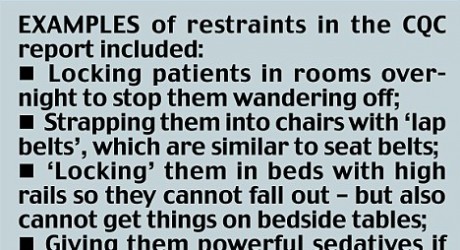The inquiry by the Care Quality Commission points out that nurses and care home staff often resort to such measures to prevent patients coming to harm through falls and other injuries – but by law they must apply for permission. The commission, the independent regulator of health and social care in England, warned that many staff members are unaware of this.
One elderly man with dementia was locked in his room at a care home every night for ten hours at a time. Nursing staff did not check on him until morning and as he was so confused that he would have struggled to use the alarm if he needed help.
Another resident was made to stay in his bed all day simply because care home staffers were waiting for the delivery of a specialist chair. The findings are further evidence of the appalling neglect and substandard treatment of the elderly in hospitals and care homes.
The UK Daily Mail’s Dignity for the Elderly Campaign has fought for better standards. But last month a damning report by the Health Service Ombudsman warned that patients were routinely denied their basic needs and left soaked in their own urine and unfed for hours at a time.
Under a law introduced in 2009, hospital or care home staff who think a patient needs to be restrained to protect him or her from coming to harm must apply for a Deprivation of Liberty Safeguard order from councils or health trusts.
Restraint may include locking patients in rooms or wards overnight, sedating them or putting them in beds with high protective rails.
Applications made
Last year a total of 7,160 applications were made but only half were approved – the majority for patients suffering from dementia. Orders are often turned down because officials believe the restraint is unnecessary and patients can be looked after by less draconian measures.
However, the CQC report warned that as many staff do not know that they need to apply for these orders, they are probably going ahead and illegally depriving patients of their rights.
It stated: ‘Hospitals and care homes may be acting illegally if that person was not swiftly cared for or treated in a less restrictive way.
Unlawful deprivation
‘We came across too many examples of people using services who were being cared for in ways that potentially amounted to an unlawful deprivation of their liberty, and therefore a potential breach of their human rights.’
The study called for staff to consider other options such as employing more nurses at night so that patients did not need to be locked in their rooms for hours at a time.
Cynthia Bower, chief executive of the CQC, said: ‘The Deprivation of Liberty Safeguards” are designed to protect the human rights of this particular group of vulnerable people. Care homes and hospitals should always seek to use the least restrictive ways of caring for people.
‘If they believe there is no alternative to depriving someone of their liberty, and it is in the person’s best interests, it is their responsibility to seek authorisation through the safeguards process.
‘This was the first year of implementation of the safeguards, and all the organisations involved were feeling their way to an extent.
‘But it is essential for those who need this protection that the safeguards are implemented fully throughout the country.’
David Congdon of the charity Mencap said: ‘This report highlights a lack of awareness of liberty safeguards amongst care staff and a patchy implementation of this law across England.
‘This suggests that vulnerable people are still at risk of having their human rights undermined.’ (This article first appeared in 2013 in the Daily Mail UK and has since sparked much debate)














